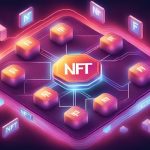
Digital advertising, an industry marked by constant adaptation, is standing at the crossroads of innovation with the advent of Non-Fungible Tokens. NFTs, known for their role in authenticating and securing ownership of digital assets, are ushering in a new era where ad creatives become exclusive and scarce commodities.
Transforming Digital Ad Creatives
As NFTs become integrated into the creation of digital advertising content, the very nature of ad creatives is undergoing a profound transformation. NFT-powered digital assets are not just files but unique tokens that represent ownership of a specific piece of content. This shift introduces an entirely new paradigm for advertisers, where each ad creative is a one-of-a-kind digital entity, distinct from any other version in existence.
The integration of NFTs into digital ad creatives opens up exciting possibilities for monetization and tokenization. Advertisers can tokenize their campaigns, creating limited editions of ad content that users can own, trade, and collect. This shift from a traditional model of paying for impressions to one centered around digital ownership has the potential to revolutionize the revenue streams for advertisers. NFTs not only provide a new dimension to creativity in digital advertising but also offer a novel economic model that aligns the interests of advertisers, creators, and consumers.
To illustrate the transformative power of NFTs in digital advertising, let’s examine some successful case studies where brands have leveraged these tokens to create unique and memorable ad campaigns. Brands are increasingly recognizing the value of using NFTs to engage their audiences in novel ways, whether through limited edition NFT-powered ads or interactive experiences that involve tokenized assets.

NFTs and Consumer Engagement
One of the critical aspects of successful digital advertising is consumer engagement. As attention spans shrink and audiences become more discerning, advertisers are constantly seeking innovative ways to capture and maintain attention. NFTs offer a solution by providing a new layer of interactivity and personalization to digital ad experiences.
By leveraging NFTs, advertisers can create campaigns that go beyond traditional impressions and clicks. Users can now actively engage with the brand by owning a piece of the ad campaign itself. This ownership fosters a sense of connection and loyalty, as consumers become stakeholders in the digital assets they interact with. The gamification of ad experiences through NFTs further amplifies engagement, turning ad consumption into a dynamic and participatory process.
Moreover, NFTs enable advertisers to tailor their campaigns to individual preferences. Through tokenized assets, brands can offer personalized and customizable ad experiences based on user data stored securely on the blockchain. This level of personalization not only enhances the user experience but also allows advertisers to deliver targeted and relevant content, thereby maximizing the impact of their campaigns.
Challenges and Opportunities
 While the integration of NFTs into digital advertising holds immense promise, it is not without its challenges. One of the primary concerns is the environmental impact associated with blockchain technology, particularly the energy consumption of certain consensus mechanisms like Proof of Work. Advertisers and NFT platforms must address these concerns and work towards more sustainable solutions to ensure the long-term viability of this technology in the advertising space.
While the integration of NFTs into digital advertising holds immense promise, it is not without its challenges. One of the primary concerns is the environmental impact associated with blockchain technology, particularly the energy consumption of certain consensus mechanisms like Proof of Work. Advertisers and NFT platforms must address these concerns and work towards more sustainable solutions to ensure the long-term viability of this technology in the advertising space.
Legal and ethical considerations also play a crucial role. As NFTs gain prominence, questions around copyright, licensing, and the protection of intellectual property become paramount. Advertisers need to navigate the evolving legal landscape surrounding NFTs to ensure that their campaigns comply with existing regulations and standards.
Despite these challenges, the opportunities presented by NFTs in digital advertising are vast. The ability to create unique, scarce, and tradable digital assets opens up new revenue streams for advertisers. Brands can explore partnerships with NFT platforms, artists, and influencers to co-create tokenized campaigns that resonate with their target audiences. The decentralized and transparent nature of blockchain technology also allows for greater accountability and trust between advertisers and consumers, fostering a more authentic and sustainable advertising ecosystem.
NFTs in Data and Analytics
Beyond the creative realm, NFTs are poised to revolutionize the way advertisers collect and analyze data. The immutable and transparent nature of blockchain technology ensures the integrity and accuracy of data related to user interactions with NFT-powered ad content. This data can be leveraged to gain deeper insights into consumer behavior, preferences, and engagement patterns.
NFTs provide a unique solution to the challenges of data privacy and transparency that have plagued the digital advertising industry. Users have control over their data, and advertisers can access valuable insights without compromising user privacy. This shift towards more transparent and user-centric data practices aligns with the growing demand for ethical and responsible use of consumer data in the digital age.

 Navigate the crypto and NFT landscape with ShareNFT. From investment tips to technological advancements, we unravel the complexities of blockchain. Empower yourself to make informed decisions in the dynamic world of digital finance.
Navigate the crypto and NFT landscape with ShareNFT. From investment tips to technological advancements, we unravel the complexities of blockchain. Empower yourself to make informed decisions in the dynamic world of digital finance. 




